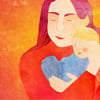
I have often thought that people should write their own obituaries. Indeed, I have started writing my own. Why should I leave it to others to decide what’s important to share about my life story? However, my mother did not have that opportunity, and it’s impossible to condense my perception of her into one coherent blog post, so I’ll just share a couple of things that I will always be grateful to her for.
I never knew how my father felt when my mother would say that she had wanted to get married only so that she could have children. But as her daughter, that statement meant that my two siblings and I were the most important people in her life. Only now that I’m a parent do I appreciate the endless hours she put into raising me. It wasn’t just the shopping trips or visits to the orthodontist; it was the constant counseling I required. Without fail, she was available to help me deal with my complicated social life (even if the downside was that she remembered exactly who did what long after I forgot).
More importantly, she and my father gave me their full attention whenever I needed it for as long as I needed it, helping me navigate my inner world, the world of my “bad thoughts.” I didn’t know what was wrong with me, but as soon as I was old enough to think, I was thinking obsessively about life’s painful realities—like why some kids were in wheelchairs or why some people were unhealthy.
I cry now when I remember with gratitude their way of gently comforting me, of never making me feel foolish, or asking, “Why in the world are you still thinking about these things?”
I know now that this inner anxiety was the stirring of my Jewish soul. It was troubled by existential questions for which my life’s trajectory had yet to provide answers. But this soul, this pintele Yid, was a spark, literally a part of G‑d, that I inherited from my mother. And when I say I’m eternally grateful to her for it, I mean it. Now that I finally understand what to do with it.
When we became observant, I was relieved, and somehow sure that Torah and chassidut provided meaningful answers to everything that had caused me anguish as a child. But I was 31 when we started our Jewish journey, and I didn’t know an aleph from a bet. There was so much to learn—and just as much to unlearn—that I occasionally wished my soul could have been more content with what was.
Now, almost 30 years later, it’s hard not to see G‑d’s unmistakable hand in my transformation. And the transformation was not just in my life, but in my husband’s and our children’s lives as well. But the truth is that the transformation came with a heavy price.
Because every time the journey became difficult, my parents were the “go-to” people to blame. Why didn’t they teach me how to pray in Hebrew? Why was I never shown how to love a fellow Jew? And my dissatisfaction with what I didn’t get Jewishly as a child invariably led to feelings of guilt: where was my gratitude for what they did give me?
When I stood before my mother’s casket, I sobbed as I begged her for forgiveness for anything I ever did that hurt her. For me as a baalat teshuvah, a returnee to Torah observance, honoring my parents was a challenging mitzvah.
My parents were wonderfully supportive, especially compared to some other parents of baalei teshuvah. My mother would dress up for our Purim parties, and my father was instrumental in raising money for the new yeshivah in Pittsburgh. Still, I know it caused my parents pain that our Pesach Seder started too late and went on too long for them to join us, and that we couldn’t eat in the same restaurants. They loved their grandchildren and great-grandchildren, who raided their “kosher cupboard,” and they were proud of the young rabbis in our family, but our uncompromising lifestyle choices mystified them. Their friends whose children had intermarried had easier lives, at least on the surface.
My mother’s Jewish pragmatism didn’t diminish the fire of her own pintele Yid, though. She was diligent about lighting her Shabbat candles, going to synagogue for Yizkor, visiting her parents (and later, my father) at the cemetery. And when I talked to her about Moshiach’s imminent arrival, she answered unequivocally: “I’m ready.”
One of the traditional ways to officially end the shivah, the seven-day mourning process, is to walk around the block, which my brother Robert and I did together. As we walked against a cold March wind, I told him that our mother was now in the world of truth, olam ha-emet. The outer shell of her body has been shed, and the inner light of her G‑dly soul now shines completely, without constraint.
I assured him that our parents are very much with us, even though they’re not physically here. They can help us, especially in our G‑dly endeavors. (I told him I wasn’t sure what they could do for his golf game, though.) And because this material world is the place where G‑d wants us to make His presence felt, we should do more mitzvahs in our parents’ memory, because they are no longer here to do them. (I don’t ever remember being able to articulate the purpose for creation so well in such a short time.)
I know that my mother enjoyed hearing about my blog, even if she called it a “glob.” So, if you have a special appreciation for this “glob” post, well, maybe she’s helping already.





